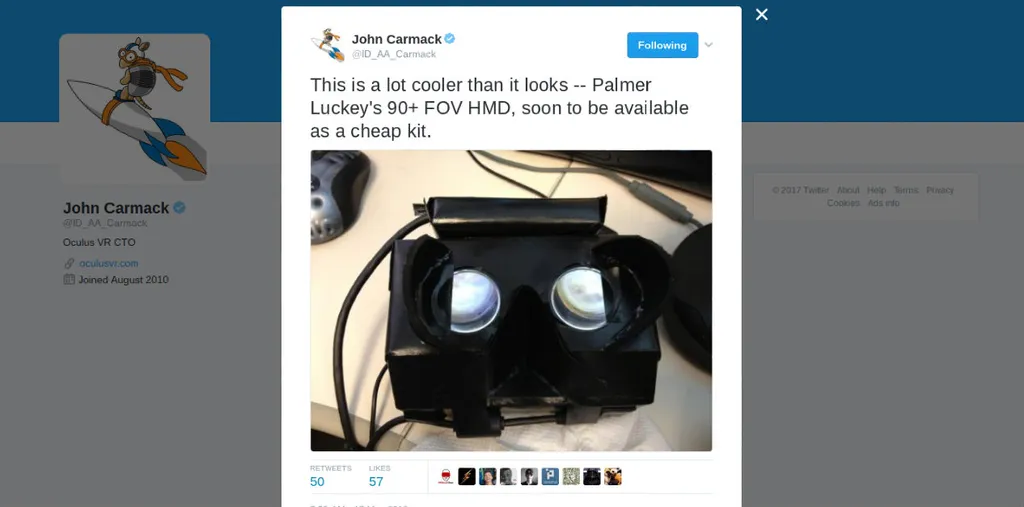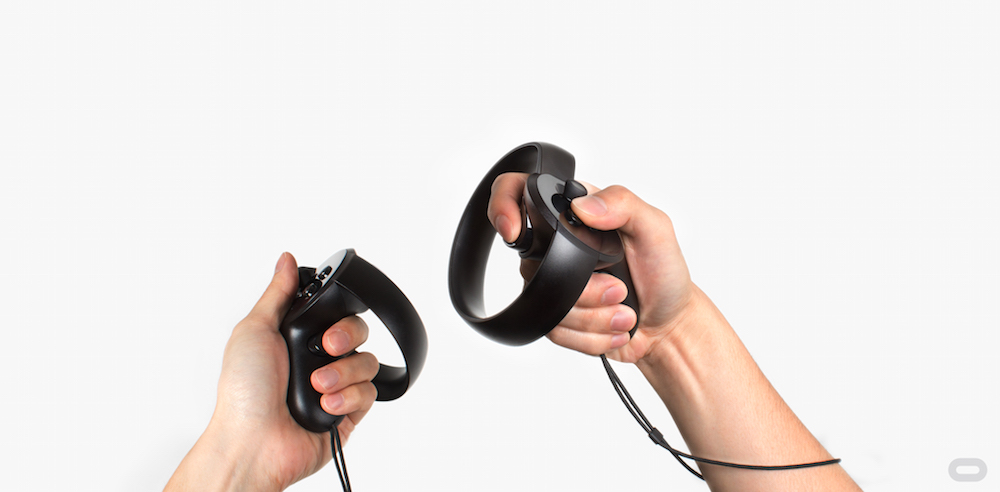The above tweet comes from May 17, 2012, almost five years ago now, with John Carmack showing off the early prototype of the Rift he received from Palmer Luckey. This tweet helps mark the beginning of a journey that drove interest in VR to include millions of people.
A lot can change in five years. Now, the stakes are raised with billions of potential customers being pursued by the world’s biggest technology companies.
We were surprised when we heard in December Oculus co-founder and former CEO Brendan Iribe moved into a role at Facebook focused on leading a PC VR research team. A month later, we learned why it happened.
Turns out Google veteran and former Android leader Hugo Barra was Facebook CEO Mark Zuckerberg’s choice to lead the company’s VR efforts. Now with Barra, the company seems to be embarking on a larger reorganization effort inside Facebook to streamline the company’s push into mixed reality. Here’s Oculus chief technology officer John Carmack replying to TechCrunch writer Lucas Matney saying the reorganization has helped clarify “a lot of things”:
@Lucas_Matney My job hasn’t changed at all, and I am really happy with the re-org, which has clarified a lot of things.
— John Carmack (@ID_AA_Carmack) March 31, 2017
March 31 was of course Oculus co-founder Palmer Luckey’s last day at Facebook. The company indicated to us in December he was still an employee and we’d get updates on his role soon. Aside from a $500 million decision from a Texas jury, however, the biggest change for Oculus since December is the addition of Barra to the team. So it seems possible Luckey’s departure might be a byproduct of Facebook attempting to clarify the positions and goals of key leadership and teams within the company. Update: Barra’s first official day at Facebook is April 3, the first weekday after Luckey’s last day at the company. Facebook declined to comment about the reason for Luckey’s departure, and Luckey hasn’t responded to a request for comment via his Facebook account, but is it possible Luckey just didn’t fit into the new plan?
Facebook continues to hire for dozens more positions in a huge build up against Google, Amazon, Microsoft and whatever secret projects Apple is cooking up. Microsoft, for instance, just hired Liz Hamren from Oculus to lead the company’s marketing efforts as mixed reality becomes a high priority for the tech giant this year. On the technical side, Microsoft hired pioneering researcher Mark Bolas last year. In October, Facebook hired Rachel Rubin Franklin to head up the company’s social VR efforts, drawing on her experience with The Sims to put us in shared virtual worlds.
UploadVR recently spoke with Max Cohen, the head of mobile product at Oculus, who explained the need for the reorganization:
We’ve always thought of Oculus as spanning both mobile and PC. In reality, that’s tough. It’s tough on engineering. It’s tough on roadmaps. It’s tough on just making sure that you are able to move quickly for platforms that are pretty different. The Rift is a gaming platform first, and so it has some needs that aren’t always the same as Gear, which is a platform that really shines with some of the movies and videos and some light gaming as well.
While the company still works to make technologies cross-platform, “you now have people that identify more closely with one particular organization,” Cohen said. Engineers aren’t in silos, as Cohen put it, but the reorganization is meant to help with focus and the “functional speed of execution.”
While Palmer Luckey undeniably kickstarted interest in VR with the Rift crowdfunding project, it is not clear that he could help the company quickly execute on its ideas and bring a standalone headset to market one day that marries the best of mobile headsets to the best of PC ones.
Carmack has been focused on mobile since he joined the company, and his focused work helped get Gear VR to market in late 2014. Luckey’s Rift, the thing which got people interested in VR, is just now hitting its stride in 2017 (despite research and funding starting in 2012) with tracking bugs fixed, quality content rolling out frequently and impressive hand controllers.
Even so, Gear VR is owned by more than 5 million people, while the Rift’s numbers are kept secret probably because they aren’t anything to be impressed by yet, at least in comparison to PSVR’s nearly 1 million sold. The larger takeaway being that Carmack is still at Oculus in the same role he’s always been in because he’s a highly proficient and experienced engineer with a track record of delivering lots of good ideas. Just today the roll-out of a software improvement is underway born from Carmack’s work which dramatically improves the perceived resolution inside the Gear VR — eliminating a major criticism of the technology when folks first notice the pixels and find text hard to read.
The stakes for mixed reality have been raised now that Apple, Microsoft, Sony, Google and Amazon are buying into VR and AR so heavily. Carmack’s contributions after the Kickstarter campaign for Oculus are clear, but Luckey’s contributions much less so. The Touch controllers were referred to as his “pet project,” but his efforts to be the public face of the company may have been a distraction precisely when everything at Facebook needed to accelerate.
This seems to mean Oculus needs more people like John Carmack. And while Luckey will be “dearly missed” at Facebook, it is likely they’ll be looking to Carmack as the model for future engineering hires.
Update: The last paragraph of this story was updated to make a clearer point.






























